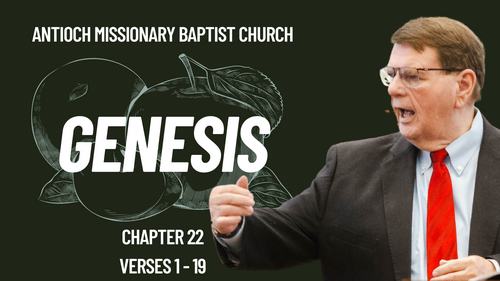Sermon Takeaway 11/02/2025

The God Who Sees and Provides: Walking by Faith Through Life's Greatest Tests

The story of Abraham and Isaac on Mount Moriah stands as one of the most profound accounts of faith in all of Scripture. It's a narrative that challenges us to examine the depth of our relationship with God and asks a fundamental question: What does it truly mean to trust the God of heaven with everything we hold dear?
The Journey Before the Test
Before we can understand the test Abraham faced in Genesis 22, we must appreciate the journey that brought him there. Abraham's life wasn't a straight path to spiritual maturity. It was marked by mistakes, moments of doubt, and seasons of growth. He had lied about his wife Sarah—not once, but twice. He had tried to help God fulfill His promise through Hagar, resulting in the birth of Ishmael. He had experienced conflicts, made poor decisions, and wrestled with his own limitations.
Yet God used every one of these experiences to prepare Abraham for what was coming. This is a crucial truth we often miss: God never wastes our mistakes. He redeems them, using them as stepping stones toward spiritual maturity. The question isn't whether we'll face difficulties or make errors in judgment—we will. The question is whether we'll allow those experiences to make us bitter or better.
At Beersheba, Abraham planted a tamarisk tree—a sign of permanence—and called on "the Lord, the everlasting God." This wasn't just another prayer; it was a declaration that Abraham had finally learned to place his complete trust in the God of heaven. He had moved from knowing about God to knowing God intimately.
Yet God used every one of these experiences to prepare Abraham for what was coming. This is a crucial truth we often miss: God never wastes our mistakes. He redeems them, using them as stepping stones toward spiritual maturity. The question isn't whether we'll face difficulties or make errors in judgment—we will. The question is whether we'll allow those experiences to make us bitter or better.
At Beersheba, Abraham planted a tamarisk tree—a sign of permanence—and called on "the Lord, the everlasting God." This wasn't just another prayer; it was a declaration that Abraham had finally learned to place his complete trust in the God of heaven. He had moved from knowing about God to knowing God intimately.
When God Calls Your Name
"Abraham!" When God called Abraham by name, the patriarch's response was immediate and complete: "Here I am." Not "Here I am, but..." or "Here I am, if..." Simply, "Here I am"—a declaration of total availability and surrender.
Then came the unthinkable command: "Take now your son, your only son, Isaac, whom you love, and go to the land of Moriah, and offer him there as a burnt offering."
Notice how God emphasizes the relationship: "your son, your only son, Isaac, whom you love." God wasn't unaware of how much Abraham loved Isaac. He was pressing on the very point of the test. Had Isaac become an idol? Did Abraham love the gift more than the Giver?
This is where we must confront an uncomfortable truth: God does not share first place in our hearts. Jesus Himself said that unless we love Him more than our closest family members, we cannot truly follow Him. This doesn't mean harboring hatred—the Bible is clear that hatred has no place in a believer's heart. Rather, it means our love for God should be so intense that all other loves pale in comparison.
Then came the unthinkable command: "Take now your son, your only son, Isaac, whom you love, and go to the land of Moriah, and offer him there as a burnt offering."
Notice how God emphasizes the relationship: "your son, your only son, Isaac, whom you love." God wasn't unaware of how much Abraham loved Isaac. He was pressing on the very point of the test. Had Isaac become an idol? Did Abraham love the gift more than the Giver?
This is where we must confront an uncomfortable truth: God does not share first place in our hearts. Jesus Himself said that unless we love Him more than our closest family members, we cannot truly follow Him. This doesn't mean harboring hatred—the Bible is clear that hatred has no place in a believer's heart. Rather, it means our love for God should be so intense that all other loves pale in comparison.
The Immediate Response of Faith
What happened next reveals the transformation in Abraham's heart. The Bible tells us he rose early the next morning, prepared his donkey, gathered his servants, split the wood for the offering, and set out for the place God would show him. There was no delay, no hesitation, no negotiation with God.
Anything less than immediate obedience to God's clear direction is disobedience. Yet how often do we respond to God's leading with "but"? We become spiritual procrastinators, always having a reason why we can't obey right now, why the timing isn't quite right, why circumstances need to change first.
Abraham's immediate response teaches us that when we're living in intimate fellowship with God, obedience flows naturally. The spiritual realm overpowers the flesh. We move from reluctant compliance to eager surrender.
Anything less than immediate obedience to God's clear direction is disobedience. Yet how often do we respond to God's leading with "but"? We become spiritual procrastinators, always having a reason why we can't obey right now, why the timing isn't quite right, why circumstances need to change first.
Abraham's immediate response teaches us that when we're living in intimate fellowship with God, obedience flows naturally. The spiritual realm overpowers the flesh. We move from reluctant compliance to eager surrender.
Faith That Believes the Impossible
The book of Hebrews reveals something remarkable about Abraham's faith during this test. Abraham believed that even if God required him to sacrifice Isaac, God would raise him from the dead. Why? Because God had promised that through Isaac would come descendants as numerous as the stars in the sky and the sand on the seashore. For God to keep His promise, Isaac had to live.
This is faith that believes God can do the impossible. It's the kind of faith that trusts God's character even when His commands don't make sense. It's the faith that says, "I don't understand, but I know You are good, and I will obey."
Do you believe God can do the impossible? The greatest miracle of all is that God takes people who are spiritually dead—dead in sins and trespasses—and brings them to life through Jesus Christ. If God can accomplish that miracle, surely He can be trusted with every impossible situation we face.
This is faith that believes God can do the impossible. It's the kind of faith that trusts God's character even when His commands don't make sense. It's the faith that says, "I don't understand, but I know You are good, and I will obey."
Do you believe God can do the impossible? The greatest miracle of all is that God takes people who are spiritually dead—dead in sins and trespasses—and brings them to life through Jesus Christ. If God can accomplish that miracle, surely He can be trusted with every impossible situation we face.
Where Is the Lamb?
As Abraham and Isaac climbed Mount Moriah together, Isaac asked the penetrating question: "Father, I see the fire and the wood, but where is the lamb for a burnt offering?"
Abraham's response echoes through the centuries: "My son, God will provide for Himself the lamb."
Jehovah-Jireh—the God who sees and provides. Abraham was learning that God sees everything happening in our lives. He knows the external circumstances and the internal turmoil. He understands the struggle, and He is preparing to provide everything we need.
God sees our physical struggles—the financial pressures, the health challenges, the practical difficulties of daily life. But He's even more concerned with our spiritual walk. He's interested in whether we're growing toward Him, whether we're putting off the old nature and walking by faith.
Abraham's response echoes through the centuries: "My son, God will provide for Himself the lamb."
Jehovah-Jireh—the God who sees and provides. Abraham was learning that God sees everything happening in our lives. He knows the external circumstances and the internal turmoil. He understands the struggle, and He is preparing to provide everything we need.
God sees our physical struggles—the financial pressures, the health challenges, the practical difficulties of daily life. But He's even more concerned with our spiritual walk. He's interested in whether we're growing toward Him, whether we're putting off the old nature and walking by faith.
The Temporary and the Eternal
One of the most liberating truths of the Christian faith is learning to distinguish between the temporary and the eternal. So much of what we think is permanent is actually temporary. The losses we grieve, the possessions we cling to, even the relationships we cherish in this life—all are temporary.
This doesn't diminish their value or mean we shouldn't care deeply. Rather, it puts them in proper perspective. When we understand that what we see is temporary but what we cannot see is eternal, we can have joy even in the midst of sorrow. We can face loss without losing hope. We can endure trials without despair.
Those who have died in the Lord are not lost—they're just ahead of us in the journey. The separation is temporary; the reunion will be eternal.
This doesn't diminish their value or mean we shouldn't care deeply. Rather, it puts them in proper perspective. When we understand that what we see is temporary but what we cannot see is eternal, we can have joy even in the midst of sorrow. We can face loss without losing hope. We can endure trials without despair.
Those who have died in the Lord are not lost—they're just ahead of us in the journey. The separation is temporary; the reunion will be eternal.
The Personal Relationship God Desires
At the heart of this account is an invitation to intimate relationship with God. This is why God created humanity in the first place—not because He needed us, but because He desired relationship with us.
God wants to be more to you than a distant deity or an emergency contact. He wants to walk with you through the mountaintops and valleys of life. He wants to speak into your heart in the quiet moments. He wants you to know Him so personally that His presence becomes more real than anything this world offers.
This kind of relationship costs something. It may cost you sleep as God awakens you to speak into your life. It will cost you your self-sufficiency as you learn to depend completely on Him. It will cost you control as you sign your name to the blank check and let God fill in the details.
God wants to be more to you than a distant deity or an emergency contact. He wants to walk with you through the mountaintops and valleys of life. He wants to speak into your heart in the quiet moments. He wants you to know Him so personally that His presence becomes more real than anything this world offers.
This kind of relationship costs something. It may cost you sleep as God awakens you to speak into your life. It will cost you your self-sufficiency as you learn to depend completely on Him. It will cost you control as you sign your name to the blank check and let God fill in the details.
Here I Am
The question this morning is simple but profound: Is that your relationship with God? Do you know Him intimately, or do you just know about Him? Do you want that personal relationship, or are you content with religious routine?
If you're a child of God, that intimate relationship is exactly where God is bringing you. The journey may be long, with many tests along the way. You may be in a valley right now, wondering if you'll ever reach the mountaintop. Don't despair. Don't turn back. God is working in you, bringing you to that place where you can see Him as He truly is.
The invitation stands: God is calling your name. Will you respond, "Here I am"?
If you're a child of God, that intimate relationship is exactly where God is bringing you. The journey may be long, with many tests along the way. You may be in a valley right now, wondering if you'll ever reach the mountaintop. Don't despair. Don't turn back. God is working in you, bringing you to that place where you can see Him as He truly is.
The invitation stands: God is calling your name. Will you respond, "Here I am"?
Watch the full sermon here:
Recent Takeaways
Archive
2026
2025
March
September
October
November

No Comments